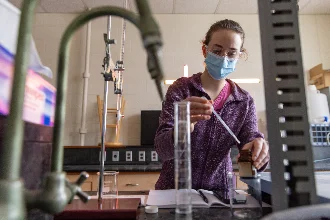

Explore the diverse roles and opportunities in the field of chemical engineering.
Whenever you've fed a dog, brushed your teeth, taken medication, worn comfortable clothing, or used household cleaning products, you've benefited from some of the many innovations connected to chemical engineering. Chemical engineers constantly strive to discover new materials, develop sustainable processes, and improve existing technologies to enhance our daily lives. Their work spans a wide range of industries, ensuring that products are safe, efficient, and environmentally friendly.
This blog explores these professionals' work, answering questions like: what do chemical engineers do, what does a typical chemical engineer work environment look like, and what skills are needed to succeed?
Chemical engineering is a branch of engineering focused on transforming materials through changes in composition, energy content, or physical state. It involves designing and managing processes that convert raw materials into valuable products. This field integrates principles of chemistry, physics, and engineering to develop methods for efficiently processing materials, ensuring that the resulting products meet specific requirements for various applications.
Chemical engineers have been integral to advancements that improve our well-being for over a century. From innovations in recycling and disease treatment to breakthroughs in energy generation and water purification, the contributions of chemical engineers are vast and impactful.

Their duties and responsibilities encompass, but are not limited to, the following:
At the core of chemical engineering is process design and development. Chemical engineers leverage their expertise in chemistry, physics, and engineering to develop and optimize manufacturing processes.
They research existing methods and then innovate new processes to separate and refine raw materials. Moreover, using computer-aided design (CAD) software, they develop equipment and methods that are both cost-effective and environmentally friendly. Their goal is to optimize production while minimizing waste and energy consumption.
Once processes are designed, chemical engineers oversee the operation of manufacturing plants. This involves monitoring production, troubleshooting issues, and implementing improvements.
By optimizing plant operations, chemical engineers help increase productivity and reduce operational costs, ensuring the manufacturing process is as efficient as possible. Their role is critical in maintaining the balance between high production output and upholding quality and safety standards.
Environmental protection is a critical aspect of this branch of engineering. Chemical engineers develop solutions to mitigate environmental impact, such as pollution control and remediation technologies. They design processes that minimize waste and reduce emissions, ensuring compliance with environmental regulations.
Their work in environmental protection helps safeguard natural resources and promote sustainable practices across various industries. This way, chemical engineering helps address global environmental challenges.
Chemical engineers are also involved in the process of product development itself, creating new materials and products that enhance our daily lives. They work on developing synthetic fibers for clothing, creating more efficient fuels, and improving food processing techniques.
By advancing product development, chemical engineers contribute to making products more affordable, safer, and better suited to consumer needs. Their innovation drives the creation of high-performance materials, medical devices, and consumer goods that meet evolving market demands.
Maintaining high standards of quality is essential in manufacturing, and chemical engineers also work in this area. They design and implement quality control procedures to ensure products meet required specifications and standards.
By conducting tests and evaluations, they identify defects and improve production processes. This ensures that the final products are of the highest quality, providing consumers with reliable and safe goods.
Safety is a major concern for chemical engineers, especially when working with hazardous materials. They establish safety procedures and protocols to protect workers and the environment. This includes designing safe equipment, conducting safety audits, and ensuring compliance with safety regulations.
Chemical engineers' focus on safety helps prevent accidents and ensures a secure working environment. Their proactive approach to risk management and safety training fosters a culture of safety within the workplace.
Finally, chemical engineers also make significant contributions to research and development (R&D) through collaborations on various projects in biotechnology, nanotechnology, and other cutting-edge fields. Through R&D, chemical engineers explore new technologies and materials, pushing the boundaries of what is possible. Their innovative work leads to breakthroughs that drive progress in various industries, from healthcare to electronics.
Chemical engineers continually develop solutions that address complex global challenges and improve quality of life by staying at the forefront of scientific research.
Chemical engineers can be found in various industries, with the largest employers being chemical manufacturing (35%), engineering services (13%), and research and development in the physical, engineering, and life sciences (13%). They mainly work in offices, laboratories, and manufacturing facilities and may visit industrial plants, refineries, and other locations to monitor operations and collaborate with technicians and mechanics to implement their designs.

Most chemical engineers work full time, and some work more than 40 hours per week. Additional hours may be required to meet production targets or to troubleshoot problems with manufacturing processes. This dynamic work environment requires chemical engineers to be adaptable, analytical, and detail-oriented to ensure successful outcomes across various industries.
Professionals pursuing careers in chemical engineering require a diverse set of abilities to excel in their roles. Below are some of the key skills that define a successful chemical engineer.
A robust understanding of science and mathematics is fundamental for chemical engineers. Their work relies heavily on applying principles from chemistry, physics, and advanced mathematics to solve complex problems.
From designing chemical reactions to optimizing processes, these foundational skills enable engineers to innovate and improve manufacturing techniques, ensuring efficiency and effectiveness in their projects.
Chemical engineers must possess strong technical proficiency, particularly in using advanced software and tools. They frequently utilize computer-aided design (CAD) software to develop and refine their projects.
Additionally, familiarity with industry-specific technologies and methodologies is crucial. This technical knowledge allows chemical engineers to design sophisticated equipment and processes that meet stringent industry standards and regulatory requirements.
Problem-solving is at the heart of chemical engineering. Engineers in this field are often tasked with identifying and resolving technical challenges, whether in research, design, or production. Their ability to analyze complex problems, develop innovative solutions, and implement effective strategies is essential.
Strong analytical skills and a creative mindset enable chemical engineers to overcome obstacles and drive project progress.
Teamwork and collaboration are critical skills for chemical engineers, who often work on large, multidisciplinary projects. They must communicate effectively with colleagues from various backgrounds, including other engineers, project managers, and manufacturing staff.
Strong interpersonal skills facilitate collaboration, ensuring that projects run smoothly and that all team members are aligned toward common goals. This collaborative approach helps achieve successful outcomes and fosters a supportive work environment.
Chemical engineers play a vital role in advancing technology and improving our quality of life. Their work spans various industries and work environments. To excel in this field, one must be well-trained and educated, obtaining the necessary skills and qualifications through rigorous academic programs.
At UND, we offer chemical engineering degrees at all levels, including a Bachelor's in Chemical Engineering, a Master's in Chemical Engineering, a Ph.D. in Chemical Engineering, and a Combined Chemical Engineering Degree (B.S. and M.S./M.Eng.). So, join us and embark on a rewarding career in chemical engineering, where you'll have the opportunity to innovate and make a significant impact on the world. Become a part of the future—where chemistry meets engineering and transforms lives.
Emerging trends in the field of chemical engineering include a strong focus on green chemistry and sustainability, emphasizing the development of eco-friendly processes and materials. Additionally, there has been a significant shift towards integrating the circular economy, advanced materials, and nanotechnology.
Chemical engineering can be challenging and sometimes stressful due to complex projects and safety concerns, but it is also highly rewarding and fulfilling. The opportunity to solve critical problems and innovate new technologies makes it a gratifying career choice.
Yes, chemical engineers earn a competitive salary, with a median annual income of $112,100, reflecting the high demand for their specialized skills.

Earn your bachelor of Chemical Engineering degree (B.S.). UND has a top-ranked on campus and online Chemical Engineering degree.
Explore UND's Chemical Engineering Program
Office of University AdmissionsGorecki Center
3501 University Ave Stop 8357
Grand Forks, ND 58202-8357
P 701.777.3000 (711 for Relay)
admissions@UND.edu
By clicking any link on this page you are giving your consent for us to set cookies, Privacy Information.